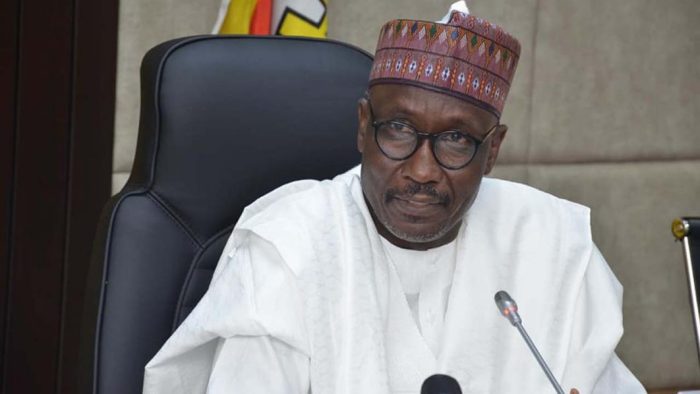By Mohammed Modu
By all accounts and estimation, the recent news coming out of the Information and Communication Technology (ICT) industry in Nigeria is heartwarming. The sector steadily but more aggressively this time around, taking its rightful position as a front-liner in our drive for our economic prosperity as a country and our welfare and development as a people. The world is currently one large IT-driven entity, it is on a march that Nigeria, as Africa largest economy cannot afford to lag behind. Recent happenings show that with a result-driven leadership in place, we are matching along with the rest of our peers.
The National Bureau of Statistics (NBS) reported that last quarter, the contribution of ICT sector to Nigeria’s Gross Domestic Product (GDP) in the second quarter of 2020 (Q2 2020) was unprecedented 17.83% of the country’s GDP. This was whooping and means a lot not only for the economy or the ICT sector drivers but, most especially, for the Nigeria and our socio-economic future.
In a report titled ‘Nigeria’s Gross Domestic Product Report’ for Q2 2020’, the NBS reported that while Nigeria’s GDP decreased by –6.10% (year-on-year) in the second quarter of 2020 that ICT’s contribution rose disproportionately. The contri
bution of the ICT increased by 20.54% in comparison with the figures a year earlier. The figure also jerked up by 3.79% from the previous quarter (Q1 2020). This calls for rolling out the drums.
To many persons, and sectors, the Coronavirus pandemic was an apocalypse. But as the saying goes, there are often blessings in disguise; it was the case for the Nigerian ICT sector. The unfortunate health pandemic, with its resultant economic downturn were turned into opportunities, thanks to the visionary and focused leadership of Dr Isa Ali Ibrahim (Pantami), the honourable minister of communications and digital Economy.
Setting the pace for the fruits the country now reaps was the conscious and strategic decision taken from the very beginning to alter policy directions by re-designing the Ministry of Communications to Ministry of Communications and Digital Economy. And, to avoid the culture of groping in the dark and rudderless journey, the Ministry prepared and unveiled the National Digital Economy Policy and Strategy, which had the blessings and support of key development partners.
With a very compass in place and a visionary sailor in the aisle, it is a little surprise that one year down the line, Nigerians are regaled by gale of developments and achievements recorded by the ministry.
In the telecommunication sector, the last one year witnessed significant increase in broadband penetration. The Ministry of Communications and Digital Economy followed up its visionary policy document, the National Broadband Plan, with a robust stakeholder engagement leading to unprecedented success of cutting down the
In July 2020, the Nigeria Communication Commission (NCC) announced phenomenal rise in broadband penetration in the country to 42.02%, translating to a percentage increase of almost double digits in less than one year. The target set for this important communication parameter is 70% and wider coverage of 4G by the year 2025.
Through most part of last month, the agencies under the Ministry of Communications and Digital Economy came together for a galore of achievements. A number of events, mostly virtual, were held to either commission projects or unveil milestones recorded in the last one year of the ministry under Dr Pantami. The agencies fell over themselves, literally, in exhibiting their activities and success stories recorded under the guidance of the minister. Earlier in July, the Minister started what was the early harvest of the projects commissioning ahead of the August anniversary of his appointment.
From Communications and ICT sectors it is stories of value addition, ICT integration, education, policy improvement, improved services, new infrastructure and support to education institutions, youths and artisans for more knowledge and capacity. It is an all-rounded success story that touches on governance, policy, skills and investment climate.
Some of the digital projects commissioned during the different phases of the event included the School Knowledge Centres, Tertiary Institution Knowledge Centre, ICT Innovation Hubs, Digital Skills for Entrepreneurs and Innovators, Community IT Training Centres, Virtual Examination Centres, and the newly completed Emergency Communication Centres.
On August 11, the minister led heads of agencies to the virtual commissioning of eleven projects spread across the length and breadth of this country.
The projects commissioned in what was the second phase of the commissiniong exercise include the Tertiary Institution Knowledge Center (TIKC) in Delta State, New Neighborhood Post office also in Delta State; Remodeled National Mail Exchange Centre in Bayelsa State; e-Health/Data Sharing Center in Bauchi State; Virtual Examination Centre in Borno State; Information Technology Innovation Centre in Kogi State; Information Technology Capacity Building Centre in Jigawa State; Information Technology Capacity Building Centre in Imo State; Emergency Communications Center (ECC) in llorin, Kwara State; Emergency Communications Center (ECC) Calabar, Cross Rivers State and School Knowledge Center (SKC) in Gombe State.
Six days later, the minister visited the headquarters of the National Information Technology Development Agency (NITDA) in Garki, Abuja, for the first time since his elevation from the CEO of the IT regulating agency to a minister a year earlier, to commission the remodelled NITDA headquarters, a project he started as the DG of the agency. In the same breath, Dr Pantami also unveiled a new Digital Studio for Virtual Learning and Computer Emergency Response and Readiness Centre sited in the same building. It was not only physical rebranding for NITDA as the minister also unveiled a new logo, mission and vision statements for the Agency.
In the next round of similar activity, Dr Pantami was assisted by three fellow ministers and the Jigawa State governor, Badaru Abubakar, at the commissioning of 12 projects and flagging off of training exercises for artisans.
The commissioned projects include E-library at the Federal College of Education (Technical) Bichi, Kano State; ICT Innovation Hub, Ibadan, Oyo State; E-Accessibility Centre, Government School for the Deaf, Malumfashi, Katsina State; Virtual Examination Centre; Digital Capacity Training Centre; and Emergency Communication Center (ECC).
Others are Enugu State College of Education (Technical), Enugu State; Digital Capacity Training Centre located at Elkanemi College of Islamic Theology, Yola, Adamawa State; School Knowledge Center (SKC), AUD High School, Ikole Ekiti, Ekiti State; and Emergency Communication Center, Kano, Kano State.
The digital capacity development programmes flagged off that dayinclude those in Suleja, Niger State; Lautech, Oyo State; FCE Okene, Kogi State; NIIT, Owerri, Imo State and Benchils School, Warri Delta State.
These were not just mere, mechanical projects, they are initiatives with organic link with the people and their needs and connection with the government’s agenda of economic diversification and opening up of new frontiers. For example, the E-Health Centre seeks to improve access to healthcare service delivery at medical facilities and the E-Accessibility Project that promotes digital inclusion of persons with disabilities through the provision of ICT and assistive technologies for healthcare facilities.
For human capital development and sustaining the gains made in digital economy drive, there is a deliberate promotion of learning and skills development. Aside the many schools-based projects and training for various groups, the Ministry through NITDA came up with the innovative concept of the Virtual Academy (digitalnigeria.gov.ng) in response to the restrictive COVID-19 pandemic. An initiative of the minister, the academy has grown in leaps and bounds and liberalised education for all segments of the society—students, civil servants, IT enthusiasts and techies.
With these strides within a year, it is no empty promise the pledge by the minister to push the contributions of the ICT sector to Nigeria’s GDP to be double that of oil in short while from now. The march is on.
Modu writes from Abuja




